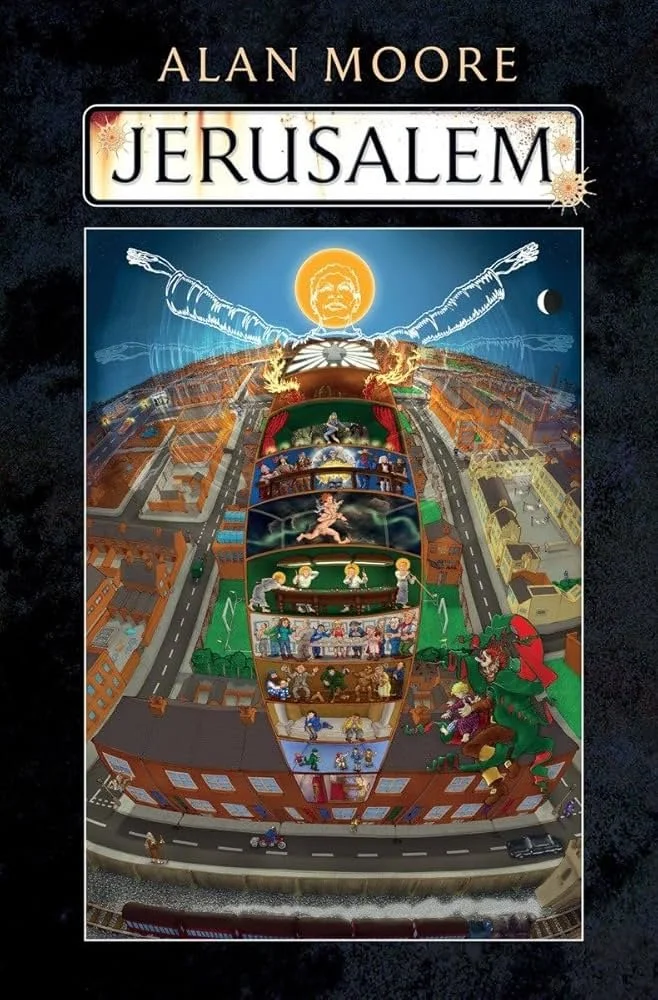Book Review : Alan Moore - Jerusalem (2016)
If history has taught us anything, it’s that you should always be suspicious of your grand idea. Axl Rose spent fifteen years on Chinese Democracy only to release a bloated, anachronistic mess. The great Francis Ford Coppola worked on Megalopolis for forty years even if he didn't even know what he wanted to say with it. That’s why I was suspicious of Alan Moore's 1200 pages novel Jerusalem. It seemed ill-advised for a comic book writer to go this hard at a medium that isn't even his. Well, I was wrong.
Mostly.
It's really difficult to explain what the story of Jerusalem is and most publications or individuals who read it didn't do a really good job either, but I'll try my best. It is centered around Alma and Mick Warren, brother and sister, born and raised in the city of Northampton, but it isn't exactly about them. It's more about the history of reality as told through what happened in a set place, to a particular family. It's one of these novels that tries to make a point more than it tries to tell a riveting story, but it kind of succeeds?
A Guide to (Sort Of) Not Get Lost in Jerusalem
I strongly suggest you watch this video before going into Jerusalem as it is going to provide somewhat of a canvas for your understanding and appreciation. Jerusalem is split in three books: The Boroughs (the history of a place mostly told through one family's relationship to the immaterial realm), Mansoul (which I can only describe as Peter Pan meets Harry Potter on LSD) and Vernall’s Inquest, where Moore connects the dots. Yeah, you gotta be patient in order read Jerusalem. It doesn't deliver itself to you.
What I understood from the novel (and I don't believe my reading to be absolute) is about how basically everything is real, even if it's not in the material realm. Memories are real, history is real and artistic creation is sure more than make beliefs. Alma Warren is a semi-famous painter (a stand-in for, you know, a semi-famous writer) and she's creating this exhibit about the boroughs which gives a new life to things that weren’t of the world of the living anymore and that were expressed to her brother through visions.
Yeah, it's complicated and overwhelming. I’m not gonna lie to you. The only novel I've read that even resembles Jerusalem is James Joyce Ulysses, which also was complicated and overwhelming and I also believe it was by design. The former was meant to liberate the art world from the perception things needed to be done a certain way and the latter was meant to liberate the world from the perception that you needed to understand reality a certain way. Did it work? I'm not so sure.
I couldn't find how many copies of Jerusalem were sold, but judging by the few online reviews, I believe not all that many people who bought the novel have actually read it. Although I'm glad that I did, I can't advocate for it in good conscience. It's just not worth the investment unless you're already familiar with what Alan Moore is talking about and unless you're a mystic or a scholar, I doubt that you are. Jerusalem requires a level of commitment that I wasn't and that I don't think anyone is prepared to give.
As Above, So Below
With that said, I don't believe that it matters if you lose the highway here or there while reading Jerusalem. It's alright to peruse a chapter for as long as you understand the big picture except perhaps for Mansoul, which is more of a conventional narrative. This one you need to pay attention to, but it's the easiest read of all three. The chapters don't quite follow each other. They are microcosms of the whole and the whole is a macrocosm of what Alan Moore is trying to break down in the chapters, so you're golden.
Moore illustrates the potentiality of his beliefs instead of just telling you how it works and although you need to put your macrocosm goggles on in order to understand the beauty of Jerusalem, you end up seeing it for what it is. I’ll give it to Alan Moore, it is rewarding, but he’ll make you fight for them hits of dopamine. The infamous chapter told from the perspective of Lucia Joyce while having a psychosis will break you, but it will create another you that's capable of appreciating things from another perspective.
*
Should you read Jerusalem? No. Not unless you're an Alan Moore superfan or into hermeticism (I'm the latter), but if you're one of these two, take it as a moment of intimate connection with mentor-like figure. I do not know anyone else who has read it outside of maybe Alan Moore superfan Michael Kazepis. But Jerusalem’s achievement is not in being read, it is simply to exist and be available to anyone who might end up on this path of rediscovery of reality. It's an ordeal, but it won't leave you feeling empty.
7.7/10
* Follow me on Instagram to keep up with new posts *






